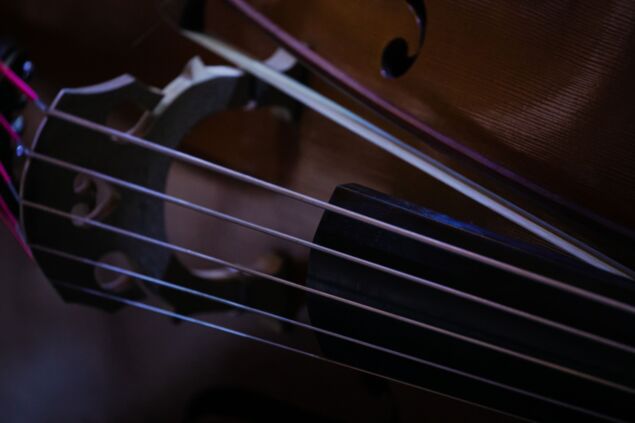With the support of the Brazilian Embassy in Russia,
Bachianas Brasileiras. Heitor Villa-Lobos
- Date:
27 Nov 2023
- Age restrictions
- 12+
Programme
Heitor Villa-Lobos (1887–1959)
Bachiana Brasiliera № 1 W246 (1930)
for eight cellos
Bachiana Brasileira № 5 W389
(1938–1945)
for voice and cello ensemble
Ironic and sentimental epigrams W183
(1921–1923)
for voice and piano
Bachiana Brasileira № 4 W424 (1930–1941)
for piano
Bachiana Brasileira № 6 W392 (1938)
for flute and bassoon
Bachiana Brasileira № 9 W449 (1945)
for string orchestra
“The map of Brazil was my harmony textbook,” the composer said. Villa-Lobos’s style was influenced by expeditions to the most remote regions of the country and encounters with bearers of folk tradition, and these encounters allowed him to synthesise three sources: South American indigenous, African, and European music. At the same time, the composer felt an unbreakable connection to the art of the Old World: Villa-Lobos was one of the organisers of the legendary Modern Art Week, which presented the full diversity of early twentieth century music to Sao Paolo in the early 1920s—from Arnold Schoenberg and composers of the New Viennese school to Les Six.
Performed by

Moscow Contemporary Music Ensemble | MCME
Elizaveta Korneeva conductor
Elena Gvritishvili soprano
Sergei Kasprov piano
Bogdan Korolyok presenter
Photo: Anya Todich
Two key sources of Villa-Lobos’s music are found in his key work, the cycle Bachianas Brasilieras, composed throughout the period between 1930 and 1945 for the most varied ensembles, from solo instruments to a large symphony orchestra. This cycle has gone down in history as a towering achievement of musical modernism and a unique example of the dialogue of two cultures—Brazilian national music and European baroque, the “cosmically folklorically universal” music of Johann Sebastian Bach and his contemporaries, as Villa-Lobos himself described it. The dialogue here unfolds on several levels. Each part of the Bachianas has a dual title: one name refers to European forms (prelude, fugue, choral, aria, gigue, fantasy), and the other to Brazilian forms (modinha, choro, cantiga, embolada). Bachianas Brasileiras presents a unique look at the aesthetics of neoclassicism that were so important to the international music scene of the 1920s—1930s—Villa Lobos’s approach differs radically from European tradition in its intensity and method of dialogue with the baroque heritage.
The concert programme will allow listeners to follow the evolution of the Brazilian composer’s work—from the bright lyricism of the sunny 1930s to the dramatic works written during the Second World War.
The Moscow Contemporary Music Ensemble (MCME) was founded in 1990 by composer Yuri Kasparov in association with the leader of the Russian avant garde Edison Denisov. MCME was the first Russian ensemble to specialise in performing the music of the twentieth and twenty-first centuries and supporting contemporary composers. It has given over 1,000 Russian and world premieres.
Elena Gvritishvili (b. 1999, Saint Petersburg) is a singer. A graduate of the Rimsky-Korsakov Saint Petersburg Music Academy (conducting and choir department, class of Fyodor Lednev and Anna Meiya), Gvritishvili is currently a student of the singing department of the Rimsky-Korsakov Saint Petersburg State Conservatory (class of Svetlana Gorenkova). Since 2020, Gvritishvili has been a choir singer in musicAeterna. She performed in the production 52 by Alexander Manotskov at the Tovstonogov Bolshoi Drama Theatre in Saint Petersburg. Since September 2022, she has been an artist of the Youth opera programme at the Bolshoi Theatre in Moscow.
Sergei Kasprov (b. 1979, Moscow) is a pianist, harpsichordist, organist. He graduated from the Moscow Conservatory as a pianist and performer on historical keyboard instruments (class of Alexei Lyubimov) and as an organist (class of Alexei Parshin). He continued to study piano at the Moscow Conservatory postgraduate programme, as well as at the Schola Cantorum Paris Conservatory under Igor Lazkov. Between 2005 and 2007, Kasparov was awarded the Special Prize of the International Competition for Young Pianists in memory of Vladimir Horowitz in Geneva, the Grand Prize of the International Competition for Young Pianists in memory of Maria Yudina in Moscow, and First Prize at the Rubinstein and Scriabin competitions in Paris. He regularly performs at piano festivals in Europe and Russia: La Roque d’Anthéron (France), Klarafestival (Belgium), Chopin and His Europe (Poland), Arts Square (St. Petersburg), December Evenings and Antiquarium (Moscow).
Villa-Lobos is one of the pillars of Brazilian national identity. By overcoming the dichotomy between popular and classical music, between folklore and academic culture, Villa-Lobos has asserted himself as a truly Brazilian composer: his sound is the sound of Brazil.
— Rodrigo Baena Soares, Ambassador of Brazil to Russia